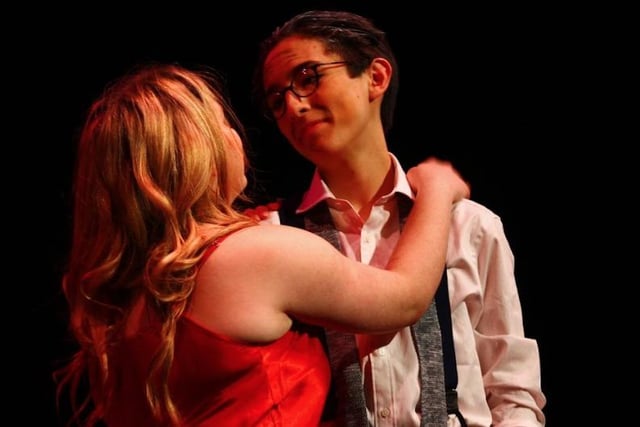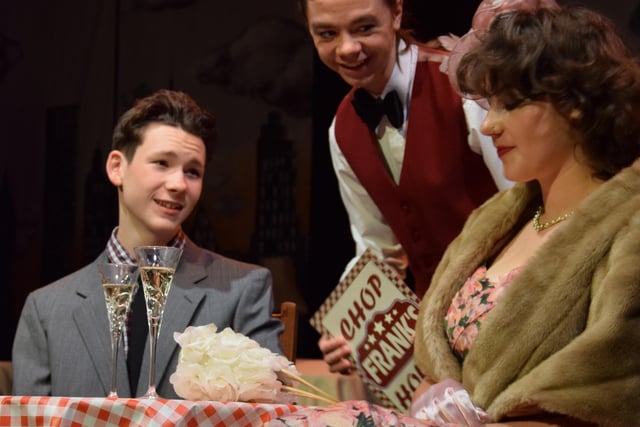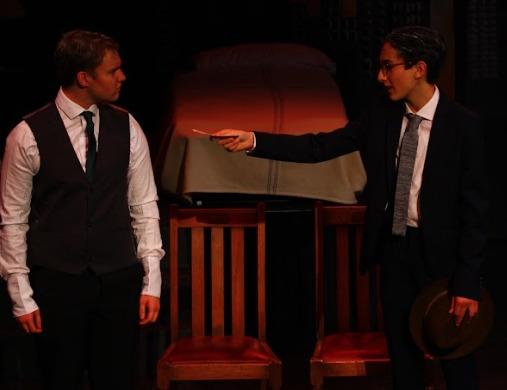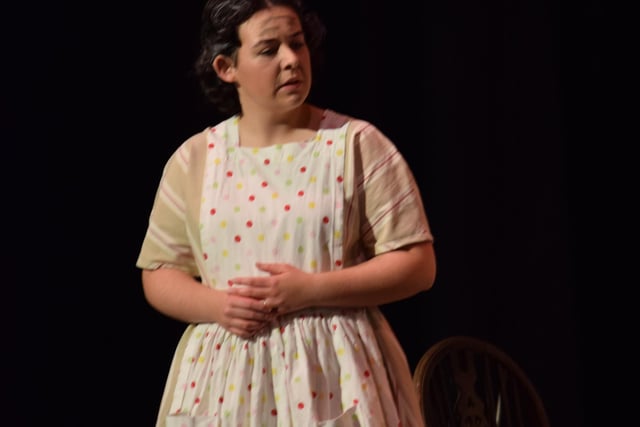The Arthur Miller play is set in 1949 Brooklyn and follows the tragic demise of a man named Willy Loman who, despite all his efforts to follow the narrative of a life he believes to be respectable and correct, just can’t seem to succeed.
The famous story is studied is well-known and studied at A-Level but spectators were able to watch with fresh eyes thanks to the Duchess’ Community High School’s performance.
The school was awarded Artsmark Platinum during lockdown and is known for its impressive productions. The packed auditorium made it clear the audience was in for a treat. It’s hard to imagine anyone was disappointed with this seamless play. The whole show was tight and their professionalism second to none.
The talent of the young people on stage was phenomenal, and it was obvious how much hard work must have gone into creating it. Not only the actors, but the sound, lighting, costumes and set design were perfectly crafted to give an immersive atmosphere. Dark and complex ideas explored in the play were no obstacle – the cast attacked it with precision and emotion, and moments of it hinted maturity far beyond their years. This is a challenging play because of the number of flashbacks and settings to convey, and this was subtly done with lighting and sound while the set barely changed. Being a story not really about the places, but rather the characters and their words, this worked well. Although, some may have found parts hard to follow.
The opening cleverly showed the parallel between the cost-of-living crisis happening right now in the UK and Willy’s situation in 1940s America, a poignant thought-provoker for the audience. It could easily be imagined happening to someone similar in this century. Pursuing an idealistic dream and believing you’re doing everything correctly as things start to go downhill, yet pride preventing the acceptance of any kind of help, is an uncomfortably imaginable circumstance. During the whole show you would find yourself willing the family to see eye to eye, yet also understanding each’s individual point of view and their own fears, dreams and reasons behind their actions.
The ability the young actors had to convincingly play such a range of ages was impressive. Sean Baker and Tyler Kelly, playing Biff and Happy Loman, had the task of showing their characters both in their 30s and as children during Willy’s flashbacks. They did a fantastic job of adjusting their energy levels and mannerisms so it was clear, despite both being taller than their father. The challenges didn’t stop there. Despite technically being dead, Archie Braid’s Uncle Ben had a solidly commanding presence.
The casting of Willy was perfect. Makoto Kurio’s portrayal of the old man’s descent into insanity was brilliant; he not only delivered every line with vigour and accuracy, but his movements and posture left the audience in no doubt this teenager was in fact a sixty-three-year-old man, beaten down over the years. Willy’s wife Linda was played by Hannah Van Loon, who also delivered her emotive lines with immense power. Linda’s story was perhaps the most heart-breaking of all, watching her sons and her husband tear each other apart as they tried to make each other happy.
Joseph Johnson and Noah Moody portrayed the ‘liked, but not well-liked’ father and son duo of Charlie and Bernard. They reached much greater success than Willy and his sons by simply having different priorities and understanding of how to approach life. Despite all their efforts to help the Lomans, they were constantly turned down and their help refused. Willy’s mindset was clearly outlined with every interaction involving them, leaving the audience frustrated and saddened.
The story could not have been told without all the supporting actors who, despite having small roles, fitted into the show with ease and each brought their own characters to life. Ben Shirley, playing Stanley the waiter, provided a couple of perfectly timed comedic additions. The accents were impressive too.
Of course, credit must also be given to the whole team behind the operation: the directorial team, backstage crew, hair and makeup, costumes, lighting, set design and sound.
Scanning the audience after the show and an enthusiastic standing ovation, many people were in tears and that’s a credit to the quality of it. People on that night were enthralled, moved and I’m sure inspired by the captivating performances from such talented teenagers. It was truly remarkable and I hope many of them are seriously considering careers in the arts.
Cast
Makoto Kurio (Willy Loman), Hannah Van Loon (Linda Loman), Sean Baker (Biff Loman), Tyler Kelly (Happy Loman), Archie Braid (Ben), Joseph Johnson (Charlie), Noah Moody (Bernard), Sophie Mclaren (The Woman), Leah Ritchie (Jenny), Isabel Baskerville (Letta), Edmund Turner (Howard Wagner), Elana Purkins (Miss Forsyth), Ben Shirley (Stanley).
Directorial team
Martin Allenby (Director), Abi Inglis-Jones (Assistant Director).

1. Death of a Salesman
Makoto Kurio (Willy Loman) and Sophie McLaren (The Woman). Photo: Mace Holtom

2. Death of a Salesman
Tyler Kelly (Happy Loman) , Ben Shirley (Stanley) & Elana Purkins (Miss Forsythe). Photo: Hollie Hetherington

3. Death of a Salesman
Joseph Johnson ( Charley) with Makoto Kurio (Willy Loman). Photo: Mace Holtom
